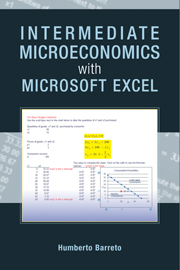Book contents
- Frontmatter
- Contents
- Preface
- User Guide
- Introduction
- PART I THE THEORY OF CONSUMER BEHAVIOR
- 1.1 Budget Constraint
- 1.2 Satisfaction
- 1.3 Optimal Choice
- 1.4 Comparative Statics
- 1.5 Endowment Model
- 1.6 Bads
- 1.7 Search Theory
- 1.8 Behavioral Economics
- PART II THE THEORY OF THE FIRM
- PART III THE MARKET SYSTEM
- Conclusion
- Index
1.7 - Search Theory
from PART I - THE THEORY OF CONSUMER BEHAVIOR
Published online by Cambridge University Press: 05 June 2012
- Frontmatter
- Contents
- Preface
- User Guide
- Introduction
- PART I THE THEORY OF CONSUMER BEHAVIOR
- 1.1 Budget Constraint
- 1.2 Satisfaction
- 1.3 Optimal Choice
- 1.4 Comparative Statics
- 1.5 Endowment Model
- 1.6 Bads
- 1.7 Search Theory
- 1.8 Behavioral Economics
- PART II THE THEORY OF THE FIRM
- PART III THE MARKET SYSTEM
- Conclusion
- Index
Summary
Price dispersion is a manifestation – and, indeed, it is the measure – of ignorance in the market.
George StiglerThe Theory of Consumer Behavior is based on the idea that buyers choose how much to buy based on preferences, income, and given prices. We know, however, that buyers do not face a single price – there is a distribution of prices. Consumers do not know the prices charged by each firm. We simplify the problem by assuming that the product is identical (i.e., homogeneous) so the consumer wants to buy at the lowest price. Unfortunately, finding that lowest price is costly so the buyer has to solve an optimization problem.
Search Theory is an application of the economic approach to the problem of how long to shop in a world of many prices. Search is a productive activity because it enables one to find lower prices, but it is costly. One can search too little, ending up paying a high price, or oversearch – spending hours to find a price that is a few pennies lower does not make much sense.
This chapter introduces the consumer's search optimization problem and is based on the idea that consumers decide in advance how many price quotes to obtain, according to an optimal search rule. This type of search procedure is known as a fixed sample search.
Describing the Search Optimization Problem
Step Open the FixedSampleSearch.xls workbook and read the Intro sheet, then proceed to the Setup sheet.
- Type
- Chapter
- Information
- Intermediate Microeconomics with Microsoft Excel , pp. 229 - 248Publisher: Cambridge University PressPrint publication year: 2009



